#eä
Explore tagged Tumblr posts
Text
The Music of the Ainur. Never been anything like it before or since. 10/10 would recommend.
no more blorbo questions what was the first music album that changed you fundamentally
45K notes
·
View notes
Text
In the beginning Eru, the One, who in the Elvish tongue is named Ilúvatar, made the Ainur of his thought; and they made a great Music before him. In this Music the World was begun; for Ilúvatar made visible the song of the Ainur, and they beheld it as a light in the darkness. And many among them became enamoured of its beauty, and of its history which they saw beginning and unfolding as if in a vision. Therefore Ilúvatar gave to their vision Being, and set it amid the Void, and the Secret Fire was set to burn at the heart of the World; and it was called Eä.
Then those of the Ainur who desired it arose and entered into the World at the beginning of Time; and it was their task to achieve it, and by their labours to fulfil the vision which they had seen. Long they laboured in the regions of Eä, which are vast beyond the thought of Elves and Men, until in the time appointed was made Arda, the Kingdom of Earth. Then they put on the raiment of Earth and descended into it, and dwelt therein.
— Valaquenta (J. R. R. Tolkien)
#book quotes#fantasy fiction#j. r. r. tolkien#tolkien#the silmarillion#valaquenta#music#religion#creation#music of the ainur#eä#arda#earth#ilúvatar#ainur#valar#gods#secret fire
1 note
·
View note
Text

The Timeless Halls
Aulë & Melkor
#melkor#morgoth#aule#silmarillion#silm art#tolkien#valar#timeless halls#trying to imagine what a place outside of the created universe might look like#maybe you can ‘’see’’ the Eä from there#and there's no mention of it but I'm guessing there are other worlds out there somewhere#Aule on the left Melkor on the right#void tourism is on the rise#Melkor just became Tolkien’s universe’s first hiker and he can’t shut up about it
2K notes
·
View notes
Text
the Valar scratching their head, while looking around at the barren land of Eä, before they realise they have to build the land in their vision with their own hands.
#txt#sauronpilled reading session#i just know they were fuming#especially melkor but he was probably a little excited about it because he start claming Eä lmaooo
4 notes
·
View notes
Text
What reminded me of this today was hearing "Young Sandy Gray lives on today/In the echoes of a mighty yell" ("Breakfast in Hell", Slaid Cleaves) for the nth time and thinking about another famous echoing yell (at Lammoth). Then I remembered my other northeastern North America water disaster Tolkien filk idea.
a couple verses of "The Fall of Maedhros Nelyafinwë"
to the tune of "The Wreck of the Edmund Fitzgerald"
The legend lives on though Noldor are long gone Of Fëanor's red headed eldest He could not disregard the fate of Arda marred Thus fell Maedhros Nelyafinwë
Sword at Morgoth's behest set 'gainst Fingolfin's breast And Fëanor was not held guiltless Sent away from Doom's Ring with him went the King When Fëanor's exiled to Formenos
When his kinsmen burned instead of returned The ships they had plundered from Olwë He knew it was wrong and for his love of Fingon Aside stood Maedhros Nelyafinwë
This has been in my head since I first noticed "Maedhros Nelyafinwë" (somewhat) scans. I hope now it's in your head, too, and that you're inspired to help finish it.
Additional fragments:
In Valinor he grew; the Two Trees they did too
There followed Maedhros Nelyafinwë
Loyalty pulled him to Formenos
Betraying Maedhros Nelyafinwë
#Eä#Breakfast in Hell#Slaid Cleaves#two element lists I-forget-who style#two element lists ragin-rayguns style
6 notes
·
View notes
Text
"You fail, Death-Lord! You destroy the instrument, but not its music. With all your power you have gained only a broken shell." In that moment, when the harp had been silenced, arose the songs of birds, the chiming of brooks, the humming of wind through grass and leaves; and all these voices took up the strands of melody, more beautiful than before. And the Lord of Death fled in terror of life. -Lloyd Alexander
0 notes
Text
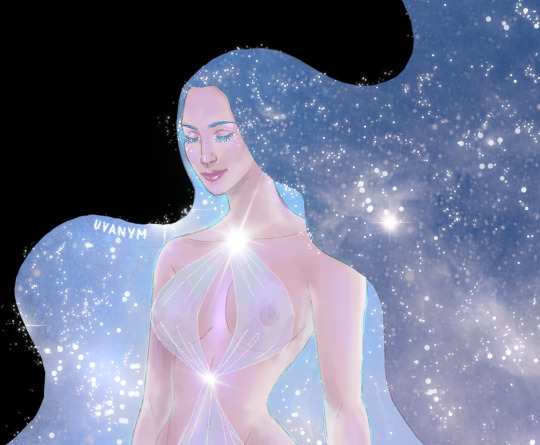
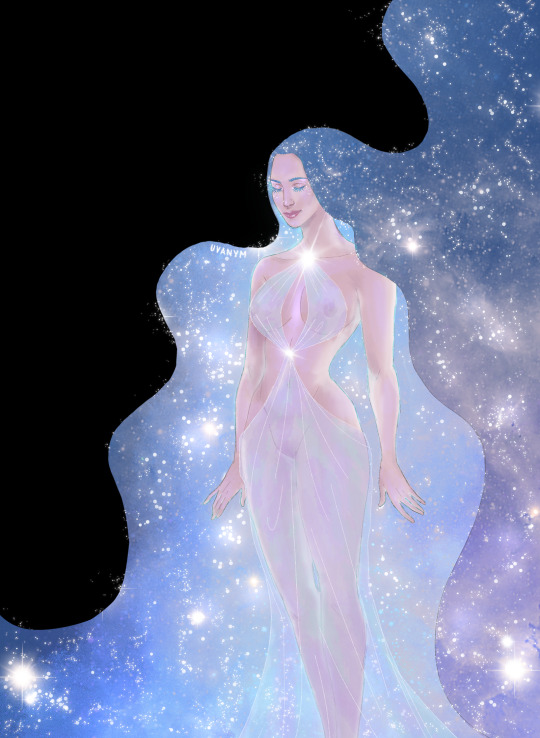
To Varda, Ilúvatar said: 'I will give unto thee a parting gift. Thou shalt take into Eä a light that is holy, coming new from Me, unsullied by the thought and lust of Melkor, and with thee it shall enter into Eä, and be in Eä, but not of Eä.'
1K notes
·
View notes
Text
Old Tom BombiDiil is a glaring fellow, dull blue his jacket is and his eyes are yellow
I was trying to get Bing to generate an AI art poster of Zach Snyder's movie about Tom Bombadil. First result:

This does capture the tone right, but I wanted to fix the poster, and so I asked it to correct the spelling. I then got a bunch of relatively boring things. So I asked it to "put Sexy Goldberry in there". And got, I think you'll all agree, True Art.

#Tom Bombadil movie? Could it possibly be good?#whoops#was distracted by Old Tom Bombadil; missed the joke#Eä
7 notes
·
View notes
Text
“I have many names”: Halbrand, the Repentant Mairon in “Rings of Power”
The themes of redemption, second chances and forgiveness are major in Tolkien legendarium. This is due to Tolkien’s Catholic faith, and the belief that no one is irredeemable in the eyes of God, no matter how low they might have fallen.
And we see “Rings of Power” exploring these themes with Sauron’s character in Season 1. Or better yet, with Halbrand, which is the name the show chose for “Repentant Mairon” (Sauron’s original name) of Tolkien lore.
Nothing is Evil in the Beginning
This is the first quote in “Rings of Power”, narrated by Galadriel. This is a reference to Elrond’s quote in “Fellowship of the Ring” book: “For nothing is evil in the beginning. Even Sauron was not so.”

In the beginning of time, in the Days before Days, Mairon (the admirable) was created by Eru (God) as a Maia of Aulë, and he was one of the most powerful Maiar (demigods or angels). He was a Maia of smithing, perfection, order and beauty, with qualities like goodness, purity of heart and loyalty, and a dislike for wastefulness. He helped shape Eä (the material universe) alongside the Valar and the other Maiar, during the Ainulindalë (the music of the Ainur), and these qualities (smithing, perfection, order and beauty) were, most likely, his contributions.
Due to his power, he was targeted by the Dark Lord Melkor/Morgoth (the most powerful of the Valar), who seduced him, with promises of greater power. Morgoth is the Satan of Tolkien lore; he was envious of Eru’s capacity of creation, and wanted it for himself. Unable to have it, he devoted himself to corrupt it (which included the corruption of several Maiar), and destroy it.
Becoming Sauron
Mairon, being an idealist, betrayed the Valar and joined Melkor, seeing in him the opportunity to make his ideas a reality. He went on to become Morgoth’s most devoted servant and chief lieutenant, in charge of Angband fortress, in Middle-earth, during the First Age.

Mairon was corrupted by Morgoth, and reshaped into darkness, and all of his qualities reversed: his love became obsession; of order and perfection into dominion and tyranny; beauty into ugliness and monstrosity (by the breeding of the Orcs), goodness into evil, and his loyalty and purity of heart into treachery and deception, becoming the “great deceiver”. The Elves created the name “Sauron” (the abhorrent), as a mockery of his own.
Eventually, Mairon started to resent Melkor, because their goals turned out to be opposite: while Melkor is chaos and destruction, Mairon is order and perfection. Melkor is brute force, Mairon is the brain. What Melkor wanted to destroy, Mairon wished to perfect. Melkor is chaotic evil, while Mairon is lawful evil.
Mairon’s whereabouts are unknown during several periods of time, especially after his defeat at the hands of Lúthien and Huan, the Hound of Valinor (so it’s uncertain if he was hiding from Morgoth, or if Morgoth locked him up somewhere).
Season 2 of “Rings of Power” has already began shedding some light on this, in 2x07:
Sauron: Be not afraid. This too shall pass. I promise you, when Middle-earth is healed, and its people see what you and I did here… all our sufferings will be worth it. Celebrimbor: “Our sufferings”?

Do you know what it is to be tortured at the hands of a god?
Sauron mentioning Morgoth next and how he treated him, seems to indicate that’s what he meant by “all our sufferings will be worth it”. And this idea goes on in this dialogue:
Sauron: Sometimes, the pain almost became a reward. Became a game. A contest, to see whose will was the mightier. Celebrimbor: And after all that, you would still choose to inflict the same pain upon me? Sauron: No. You chose it. Not I. Celebrimbor: What?
I already analyzed this scene from Tolkien theological views of this dynamic, but we can also talk about the wild amount of projection Sauron is doing here. Because the core theme of this scene is Morgoth’s treatment of Sauron, and how he’s replicating that with Celebrimbor. Which might indicate these were things Sauron himself heard from Morgoth in the past: the pain is a reward; you chose it; you [are] the true author of your own torment.
And Celebrimbor saw through this, which explains his reply to Sauron’s nonsense:

And his advise to Galadriel, in the same episode:

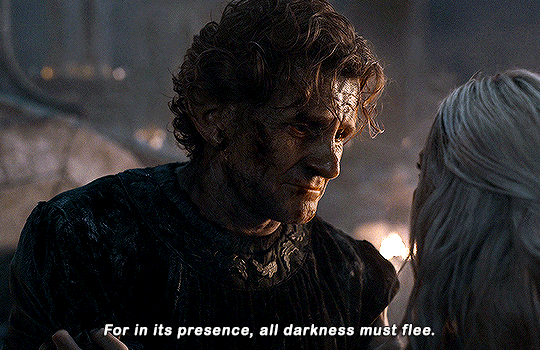
We also see Sauron crying while hearing Adar’s tale, in 2x01: “I was in your place once. In the eldest of the Elder Days. Thirteen of us were chosen to be blessed of Morgoth’s hand, with the promise of power. A new birth. I was led up to a dark and nameless peak. Chained and left.”
There are many interpretations on why Sauron cries, but I think it’s because he’s recalling his own experience of being “blessed by Morgoth’s hand”, which might have been somewhat similar, but far worse, because Mairon is truly immortal, meaning he can be subjected to every sort of torture imaginable, without truly dying, because he can always re-embody.

And even before any explicit mention of torture, this was already clear when we saw Sauron being resistant to extreme physical pain, hinting it’s something he’s very familiar with: not only he was tortured by Morgoth, but his previous physical form got stabbed into oblivion by the Orcs, without him making a sound.
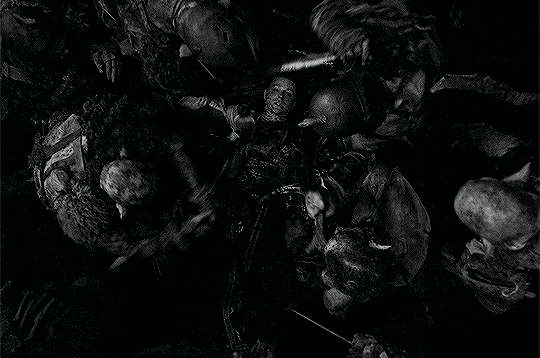

@love-and-doom asked me why didn’t the Valar or other Maiar intervene when Mairon was being corrupted/tortured by Morgoth? Or why didn’t Aulë tried to get Mairon back? Sauron himself answered to that: because he “chose it”, and he’s the true author of [his] own torment.
Free will is another major theme in Tolkien lore. And neither the Valar, and less alone any Maia, could do anything without Eru’s permission. And the moment a character sides with evil in Tolkien lore, it’s stuck with the consequences. And this goes for Marion, Adar and Celebrimbor. Because all of these characters are both victims and accomplices of Morgoth (the original source of evil), directly (Mairon and Adar), or indirectly (Celebrimbor).
Which also explains why Sauron hates and resents the Gods so much; he probably feels they have forsaken him, like they did with Middle-earth after the War of Wrath, hence him stepping in to rebuild and heal it (because no other Vala would); symbolizing his own desire of healing himself from Morgoth’s corruption.
Sauron in Truth Repented
In 2x01, we saw Sauron getting taught some humility by Adar and the Orcs unionizing against him, when he gets his physical form destroyed, by the means of Morgoth’s crown. Afterwards, Sauron is trapped in a cave for centuries, until he’s able to get out.

He, eventually, re-embodies and is able to recover his physical “fair form”, after centuries as a slimy dark substance.

When Morgoth was defeated, it was as if a great, clenched fist had released its grasp from my neck. And in the stillness of that first sunrise, at last, I felt the light of The One again. And I knew if ever I was to be forgiven... That I had to heal everything that I had helped ruin. Sauron tells Galadriel, 1x08
Soon, we see him brought low, depressed and unsure on what path to take; having a identity crisis. Some centuries trapped in a cave being goo will do that, even to a demigod (Maia).

We see him lingering on Middle-earth, and by the visual clues (wardrobe and sword) it can indicate that he might have dwelled among humans for a unknown period of time, and even found himself work as smith (sword).
The passage of time is not only hinted by his clothes, but when we, the audience, last saw him he was at Forodwaith (Northern Waste), and when he meets Diarmid, he’s in the Southlands; which means, he traveled all the way from the north to the southeast of Middle-earth.
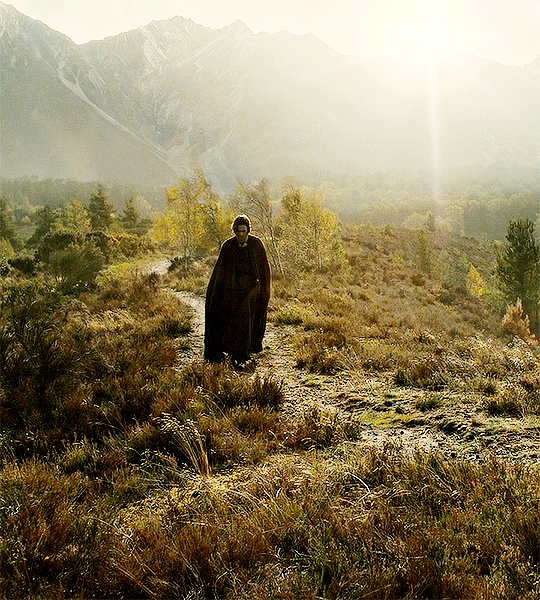
The Trials of Mairon: Diarmid
When Thangorodrim was broken and Morgoth overthrown, Sauron put on his fair hue again and did obeisance to Eönwë, the herald of Manwë, and abjured all his evil deeds. And some hold that this was not at first falsely done, but that Sauron in truth repented, if only out of fear, being dismayed by the fall of Morgoth and the great wrath of the Lords of the West. But it was not within the power of Eönwë to pardon those of his own order, and he commanded Sauron to return to Aman and there receive the judgment of Manwë. Then Sauron was ashamed, and he was unwilling to return in humiliation and to receive from the Valar a sentence, in might be, of long servitude in proof of his good faith; for under Morgoth his power had been great. Therefore when Eönwë departed he hid himself in Middle-Earth. The Silmarillion
There is a theory that Diarmid might have been Eönwë in disguise, sent by Manwë, and his mission was to test Mairon and bring him home to Aman. I subscribe to this theory, because not only it’s aligned with what Tolkien wrote, but because Amazon has limited rights to “The Silmarillion”, and needs to adapt and work around it.

And there’s some clues towards this in the dialogue itself:
That way lies death, friend. […] I know you’ve suffered. I can see it in your eyes. There’s another life waiting for you. You just have to turn toward it. […] A sure path may crumble, but there’s always another. Often, it can lead us someplace better. Someplace good. They say there’s places across the sea, a man can escape himself. Find another path. Perhaps another life. Come with us, if you like. Or, walk on. And keep chasing death. Choice is yours, friend.
Diarmid also wears the pouch of the King of the Southlands, which might be another clue; “A symbol of kings, long-dead […] My family served them.”
This is also connected with what Mairon tells Galadriel in 1x03: Be careful, Elf. The heir to this mark is heir to more than just nobility. For it was his ancestor who swore a blood oath to Morgoth. I am not the hero you seek. For it was my family that lost the war.
In "Rings of Power"; this pouch is symbolical of Mairon's blowing up his redemption, and falling back into evil.

The connection between the Southlanders and Morgoth was also a major theme throughout Season 1. This was, after all, the reason why the Elves kept watch over them for centuries: It has changed much, Watch warden. But the Men who live here have not. The blood of those who stood with Morgoth still darkens their veins. (Revion to Arondir; 1x01).
You were right to watch us. Because we are destined for the darkness. It's how we survive. Perhaps it's who we are. Who we will always be. Bronwyn to Arondir, 1x05
What we see here is that Southlanders were kept watch by the Elves to make sure they were fulfilling their penitence for siding with Morgoth, and obtaining their pardon from the Valar.
Hence Diarmid/Eönwë wearing the pouch of the King of the Southlands, as a test for Mairon: will you choose good and redemption (save Diarmid)? Or will you choose evil and Morgoth (the pouch)?
Diarmid: Nightmares again? What haunts you so? Mairon: I've done evil. Diarmid: All of us have done things that we care not to admit. Mairon: Not like I have. Diarmid: Find forgiveness. You are alive because you have chosen good. Mairon: But what of tomorrow? Diarmid: You have to choose it again. And the next day. And the next. Until it becomes a part of your nature.
And this makes even more sense with the sea serpent destroying the ship Diarmid and Mairon were traveling on, in the Sundering Seas, near Valinor. A sea creature, most likely, sent by Ulmo, the Vala of the sea. Or even Ossë, the Maia of Inner Seas, himself.

We have the Gods uniting to test Mairon and killing a bunch of humans in the process. Why I’m telling you this? Because the “Rings of Power” fandom has not yet grasped the concept of “being a God” and how Gods are d*cks, overall, who don’t care about individual lives, they look at the full picture and see reality in 5D. Like Sauron himself. And if they need to kill a bunch of people to accomplish their goals, they will. Even Eru sinks an entire island to punish its people, and He’s the ultimate good (and authority) in Tolkien lore.
And Mairon failed the test, because he chose Morgoth (the pouch), and left Diarmid to die.


The Trials of Mairon: Galadriel and Númenor
Sauron was of course not 'evil' in origin. He was a 'spirit' corrupted by the Prime Dark Lord (the Prime sub-creative Rebel) Morgoth. He was given an opportunity of repentance, when Morgoth was overcome, but could not face the humiliation of recantation, and suing for pardon; and so his temporary turn to good and 'benevolence' ended in a greater relapse. Tolkien Letter 153
Having failed one test, the Valar didn’t give up on Mairon, for they send him another: Galadriel. Who also turned her back on Heaven, by choosing to remain in Middle-earth due to her pride, and desire of hunting down Sauron. And, so, this time, they were both getting tested by the Gods. And even Mairon sees through her, in 1x02: At last, a little honesty. If you want to murder Orcs and settle a score, that's your affair. Don't dress it up as heroism.
When Mairon arrives at Númenor, he sees it as “the place across the sea” Diarmid told him about. Where he can find another path, another life. A island gifted by the Valar themselves to Men, and where they are ever watchful. And so, he believes this is where he can prove his good faith to the Valar and sought their forgiveness for his past sins and crimes under Morgoth.

However, Mairon recognizes that Galadriel can be a liability on his plan of staying at Númenor, not only due to her antagonistic atitude towards the Númenóreans, but also the bad blood between them and the Elves. And that explains his advises to her, in 1x03: “I suggest we set history aside for the moment and show some restraint. Let's try not to antagonize these people.”
When things turn sour in their meeting with Tar-Míriel, we see him employing his charming ways, and acting the diplomat: “It seems to me that our leaving presents some complications. Perhaps it'd be better if we stayed... […] Long enough, good Queen, to give you and your advisors adequate time to weigh our request. A few days, perhaps?”
Of course, Mairon’s intention is not to stay in Númenor for just a “few days”. He wants to stay there in servitude, and prove his good will to the Valar: “I have been searching for my peace for longer than you know. Please, for both our sakes, let me keep it.”
to receive from the Valar a sentence, in might be, of long servitude in proof of his [Sauron] good faith; The Silmarillion
When the petals of Nimloth, the White Tree of Númenor, fall, according to Queen-regent Míriel, the Faithful see in them the tears of the Valar, “a living reminder that their eyes and judgment are ever upon us.”

Which explains Mairon's next actions: after the meeting, he goes straight to Númenor forge, to find himself work there:
There is not another man on this isle that knows this craft better than I. I will shovel coal if needs be, I’ll splinter wood, I’ll shape a sea anchor for you, free of charge, sturdier than anything you have ever seen. How’s that? I’m here to start anew. Lend me that chance. Please. And I won’t forget it. Halbrand/Mairon asks for work at Númenor forge, 1x03
Mairon is told he needs a guild crest in order to be a smith in Númenor, and he’ll do just about anything to get it. And this is when his bounds to Morgoth and his old ways come to the surface: not only does he steal the crest from one of the smiths (and gets into a bloody street fight), but he also tells Ar-Pharazôn of Galadriel’s plans. And this was confirmed by Galadriel herself in 1x05: I wondered how the queen knew to waylay me at her father's bedside. It never occurred to me you'd hand me over for a guild crest.
And we see Mairon working at the forge, and he’s happy. It’s not random that the times we see Mairon truly happy in Season 1 is when he’s smithing; both in Númenor, and at Eregion, alongside Celebrimbor. This was what he was created to do and to be, by Eru himself. This is his purpose, and what’s he’s meant to be doing. Not getting high on power trips (Morgoth).


And this is a great contrast with Season 2: as Mairon goes deeper into evil, he embraces the sorcerer and neglects the smith. We barely saw him doing any actual smithing in Eregion, in Season 2, while in Season 1, he was involved in the entire process.
And, as Galadriel leaves, the petals of Nimloth, the White Tree of Númenor, fall. The Valar “cry”: my theory it’s in approval of Mairon’s decision of staying in Númenor, in servitude. He has proven his good will (“in truth repented”) and needs to stay on his current path (redemption is a process). But Míriel looks at it, all wrong (like her father will warn her about), and thinks it’s a warning to follow Galadriel, when it’s actually the other way around.
And 1x05, we see Galadriel acting behind his back and involving Míriel, Queen regent of Númenor, in her plans of getting herself an army to fight “Sauron” in the Southlands (the army she claims Sauron promised her, in 2x06).
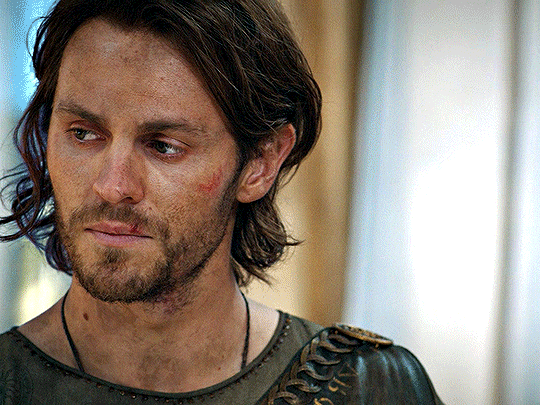
And Mairon is vexed. He doesn’t want any part in this; he wants his redemption. And this is very clear in this scene:
Míriel: My thanks, Lord Halbrand. I'm certain your fellowship will prove just as invaluable once we make landfall. Mairon: "Landfall?" Míriel: Galadriel informed us of your aspiration to unite your people. Mairon: Did she now? Galadriel: I trust she was not speaking in haste? Mairon: As a matter of fact, it was my intention... [to stay in Númenor] Galadriel: My companion is merely feeling the weight of his task. I have no doubt, come time, he will do his part. Míriel: Given that I've staked my name upon it, I should hope so. Edda: Queen Regent, your father has requested your presence in the tower. Mairon: "Galadriel informed us." Galadriel: I wondered how the queen knew to waylay me at her father's bedside. It never occurred to me you'd hand me over for a guild crest. Mairon: You used me. After I all but begged you to let me be. Galadriel: I have just convinced Númenor to send five ships and 500 men to aid your people and place a crown upon your head. Many might assume you used me. Mairon: Find another head to crown.

This is Mairon symbolically rejecting Morgoth. And this is the “good” he should have chosen. This is him passing the test, and a step closer to his redemption.
But Morgoth/Galadriel won’t give up, and she goes to the forge to persuade him into taking up the role of King of the Southlands.
I already talked about this on several posts; in Season 1, we see Galadriel being the “Morgoth” to Mairon’s “Sauron” on several occasions, by tempting him with promises of power. And this Númenor forge scene is a direct parallel with Morgoth tempting Mairon with promises of power in Aulë forge.
This idea is also present in Míriel's scene with her father, the king of Númenor, on the same episode, when Tar-Palantir warns her against going to Middle-earth and follow Galadriel:
Tar-Palantir: The kingdom! The kingdom is in danger. I must... Míriel: The danger has passed, Father. We are doing now what you always believed we must. We're restoring our connection with the Elves. I'm going to Middle-earth. Tar-Palantir: Míriel? Míriel: Yes, Father. It's me. Tar-Palantir: Don't go to Middle-earth. All that awaits you there is... Míriel: What, Father? What awaits me? Tar-Palantir: Darkness.
And this is true to both Míriel and Mairon, because darkness is what awaits for them there, should they follow Galadriel. Because, just like Adar tells her, in 1x06: It would seem I'm not the only Elf alive who has been transformed by darkness. Perhaps your search for Morgoth's successor should have ended in your own mirror.
And we see this dynamic with Galadriel and Mairon in the forge scene, where the pouch (Morgoth) is used as a plot device; while Galadriel wants him to take it, Mairon rejects it.
Galadriel: I was wrong to use you. For that, I'm sorry. Tomorrow, the queen will call you to audience. Your voice at that meeting may well decide whether this mission stands or falls. Help me. Mairon: I think I've helped you quite enough. Galadriel: Then help yourself. Stop fighting me, and together, let us fight them.
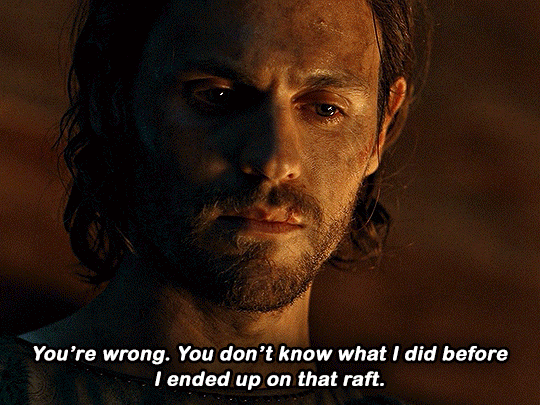

And this is when Galadriel tells him about her brother's death (although Mairon was already aware of this). But that's not what makes him reconsider, and essentially ruin his redemption. It’s when Galadriel says this:
The company I led mutinied against me. My closest friend conspired with the king to exile me. And each of them acted as they did… Because I believe they could no longer distinguish me… from the evil I was fighting.
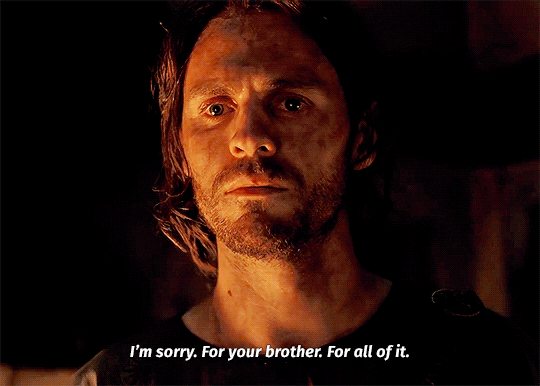
And this is personal to Mairon. Because of what happened with Adar and Orcs; not only they mutinied against him, but they could no longer distinguish him from Morgoth.
And this is related with what Adar himself tells Galadriel in 1x06: After Morgoth's defeat, the one you call Sauron… Devoted himself to healing Middle-earth, bringing its ruined lands together in perfect order. He sought to craft a power not of the flesh… But over flesh. A power of the Unseen World. He bid as many as he could to follow him far north. But try as he might… Something was missing […] For my part… I sacrificed enough of my children for his aspirations. I split him open. I killed Sauron.
Your sorrow cannot ease my pain. And nor will a hammer and tongs ease yours. There is no peace to be found for you here. And nor for me. No lasting peace in any path, but that which lies across the sea. I have fought for centuries, seeking to earn mine. This is how you earn yours.
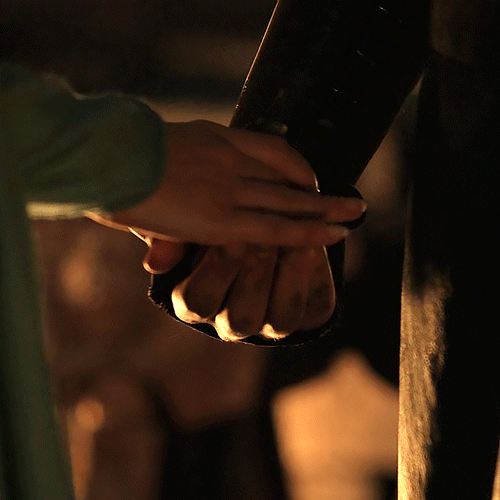
Find Forgiveness
And this is when everything collapses, and changes for Mairon. He now believes his redemption is connected to Galadriel and her forgiveness. But he’s deeply mistaken, because by following Galadriel and going to Middle-earth, all that awaits him there is darkness, like Tar-Palantir prophesied.
And that’s why Galadriel is connected to the Fall of Númenor visions: she's the “Morgoth” who brings "Sauron" back, like Gil-galad foresaw, in 1x01: “We foresaw that if it had, she [Galadriel] might have inadvertently kept alive the very evil she sought to defeat [Sauron]. For the same wind that seeks to blow out a fire may also cause its spread.”
By following Galadriel, Mairon chooses deception over redemption. And it’s like Elrond says to Galadriel in 2x02: “It was entirely of your choosing. Sauron looked inside you, plucked the very song of your soul, note by note, making himself out to be exactly what you needed. "The Lost King" who could ride you to victory.”
And this is exactly what Mairon does, hoping to earn Galadriel’s forgiveness, and redeem himself. And he makes his choice. And he chooses wrong. He fails the test; and he chooses Morgoth (the pouch), all over again.
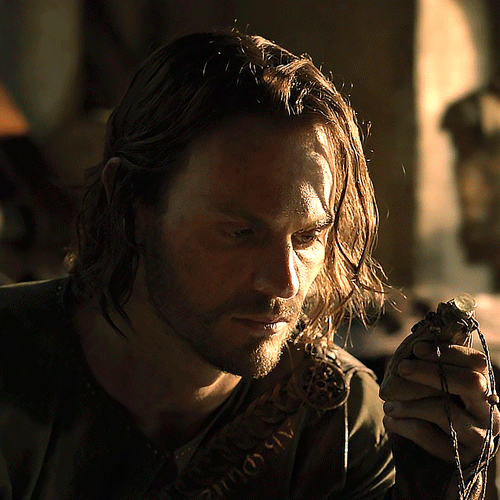
And in 1x06, we see Mairon helping people, and guiding them to safety. And he thinks it’s because of Galadriel’s influence on him, and not of his own doing. Because he’s a Maia, he was created as a servant, and he needs to serve someone, otherwise he’s lost.
Galadriel: Whatever it was he did to you, and whatever it was you did... Be free of it. Mairon: I never believed I could be... Until today. Fighting at your side, I... I felt... If I could just hold on to that feeling, keep it with me always, bind it to my very being, then I...
And when Galadriel tells him “I’ve felt it too”; it’s the confirmation and validation Mairon needed. He thinks she’ll be willing to bind herself to him, and keep him in the light, and he'll achieve the redemption he so desperately wants.
But Galadriel’s light is merely aesthetic; it’s the light of the Two Trees of Valinor, who shines on every Elf who was born during the Years of the Trees. But in her case it’s more perceptible, because of her legendary golden, shot with silver, hair. And it’s her beauty that blinds Mairon; the Maia who loves beautiful things.
Forgiveness takes an Age
Forgiveness doesn't come to folk like me. Sooner or later, they'll cast me out, you know they will. Estrid to Isildur, 2x03
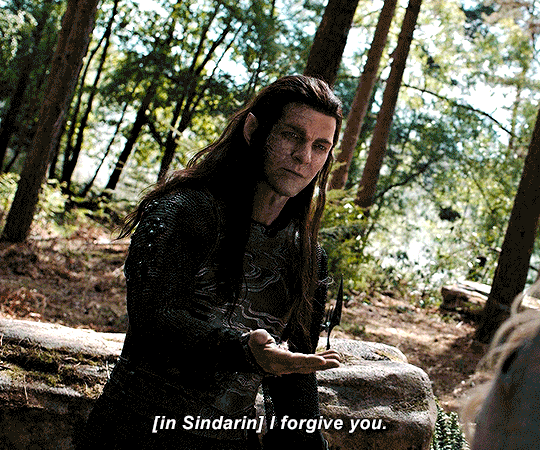
In Tolkien legendarium “forgiveness” is not just “earned”, it’s given, as well. And we see this with Frodo and Gollum in “Lord of the Rings”: it’s Frodo’s mercy and pity that ultimately allow Gollum to “redeem” himself, because he's the one who destroys the Ring, by falling down the volcano with it. Frodo, in “Fellowship of the Ring” believed Gollum deserved death and that Bilbo should have killed him when he got the chance, but Gandalf shares some wisdom with him on that topic. However, after he meets Gollum, he pities him and takes mercy on him.
And when Galadriel rejects his offer, Mairon sees it as a rejection of her forgiveness. She tells him: No penance could ever erase the evil you have done; and he sees this as confirmation of his worse fears, on a subconscious level (because he’ll try to redeem himself through the “rings of power” masterplan, still); he’s not worthy of redemption, and others will always cast him out. This is the turning point for him.
Because this is also a theme morally gray or villainous characters face in Tolkien lore (especially in The Silmarillion): they are always seen as irredeemable by others, and must die. But these characters are wrong, due to Tolkien’s ideas of redemption, rooted in Catholic faith (and this is what is called “unreliable narrators”, because “The Silmarillion” is written by the Eldar POV, and is a collection of facts, myths and gossip, essentially).
In Tolkien lore, “redemption” is a process, and a nuanced and complex idea. It’s broader than just one villain turning good overnight, because in the legendarium this process is not instantaneous. It’s pretty much like Diarmid tells Mairon in 2x01: it’s a process where the character has to progress towards good by conscious choice and free will: “you have to chose it again, until it becomes part of your nature”.
But Mairon never chooses this. And in Season 1 of “Rings of Power”, it’s exactly what Tolkien wrote: he in truth repents, temporarily turns to good and benevolence, but doesn’t see his redemption through as a result of his own choices. And the “pride” Tolkien talks about is personified in Galadriel, and him choosing to follow her, instead of staying in Númenor in servitude. But he means well throughout Season 1 and Season 2, too; when he embraces the next plot of his character arc, “Annatar the reformer”.
And this is Halbrand. And he was very much real, and not one of “Sauron’s illusions” or deceptions. He was Mairon seeking redemption and pardon from the Valar due to his crimes under Morgoth.
I'm planning on doing meta on "Annatar the Reformer" of Tolkien lore, too. But I got a feeling "he" is not over in "Rings of Power", just yet. I think that plot will continue in Season 3.
#the rings of power#rings of power#Sauron#sauron rings of power#rop sauron#sauron trop#Mairon rings of power#Halbrand#celebrimbor#Celebrimbor rings of power#Galadriel#Galadriel rings of power#diarmid#haladriel
193 notes
·
View notes
Text




“Now Fëanor's heart was still bitter at his humiliation before Mandos, and he looked at Melkor in silence, pondering if indeed he might yet trust him so far as to aid him in his flight.
And Melkor, seeing that Fëanor wavered, and knowing the the Silmarils held his heart in thrall, said at last: 'Here is a strong place, and well guarded; but think not that the Silmarils will lie safe in any treasury within the realm of the Valar!'
But his cunning overreached his aim; his words touched too deep, and awoke a fire more fierce than he designed; and Fëanor looked upon Melkor with eyes that burned through his fair semblance and pierced the cloaks of his mind, perceiving his fierce lust for the Silmarils.
Then hate overcome Fëanor's fear, and he cursed Melkor and bade him be gone, saying: 'Get thee gone from my gate, thou jail-crow of Mandos!' And he shut the doors of his house in the face of the mightiest of the dwellers of Eä.”
The Silmarillion by J. R. R. Tolkien
#the rings of power#trop#the lord of the rings#lotr#the silmarillion#silmarillion#tolkien#tolkienedit#melkor#morgoth#morgothedit#i'm so in love with melkor#books#my edits
87 notes
·
View notes
Text
Anyway, the interesting thing about the last debate of Maedhros and Maglor is that the argument Maedhros uses to win it — or the last argument we see from the winner, anyway — just... doesn't hold water when you think about it.
And Maedhros answered: "But how shall out voices reach Iluvatar beyond the Circles of the World? (..) Who shall release us?
Have you two fools (affectionate, but also please get your act together) considered that according to this reasoning, if he cannot hear you now, then he never heard you make it in the first place? I know you've grown used to believing everything is against you, but surely you don't think the world only works the way that is most inopportune to you even when it belays logic?
To be clear, I also don't think the answer is what they believe it is. Notwithstanding the fact that some of the Valar have spoken with Eru since they entered Eä (which you absolutely should know about), notwithstanding Manwë's "direct phone line" beyond, have you perhaps considered that half your problems are due to the fact that someone once managed to get an exemption from the most binding rules of the world by appeal to highest authority?
I'm certain the Oath should not be considered more unalterable
if it ever was binding.
(Technically you two eight may have written up a contract that was never ratified and which the parties on whom you swore had exceedingly good reasons not to agree to)
168 notes
·
View notes
Text
LOTR Newsletter - September 27
Who is Tom Bombadil?
Frodo asks this question twice, first to Goldberry and then to Tom himself and it – or the related question of, what is Tom Bombadil? – remains a topic of discussion in the fandom.
Looking at the answers Frodo recieves, the idea that I’ve been playing with is: Tom Bombadil is an anarchist. Or, perhaps, the anarchist. In both Golberry’s response and Tom’s, the emphasis is this: that Tom is a being who is not controlled or ruled by anyone, and fears no one and nothing and neither controls or rules anyone (though he will ocasionally call out his neighbours if they’re being unkind to travellers). His power over himself is absolute – is in danger from nothing and, as he see with the Ring, is influenced by no external force, however powerful – without becoming power over others.
When Frodo first asks who Tom is, the first thing Goldberry says is simply, “He is.” While the Biblical connection of this to the Name of God has led some to speculate that Tom is some kind of avatar of Eru, what’s occurring to me now is the relationship of this to the name of Tolkien’s universe: Eä, The World That Is. Tom’s way of life is simply to be, and to be as he is, and rejoice in being, not to achieve or to gain.
And when Tom tells stories and histories to the hobbits, he is showing them the world the way he sees it – where every living thing, even the ones hostile to them like Old Man Willow, is a protagonist in its own story, not a tool or side character in someone else’s, where everything’s being has worth in and of itself.
Tom Bombadil is a vision of an ideal world – perhaps Tolkien’s ideal world – where Power has no sway; hence he is carefree and joyous and odd and funny and the concept of dignity has no place with him. Gandalf’s role in the Third Age ultimately is (as he later says) the Enemy of Sauron; but Tom Bombadil is the antithesis of Sauron.
106 notes
·
View notes
Text

Feanorian Week day 7 - Feanor and Nerdanel
Fëanor looked upon Melkor with eyes that burned through his fair semblance and pierced the cloaks of his mind, perceiving there his fierce lust for the Silmarils. Then hate overcame Fëanor's fear, and he cursed Melkor and bade him be gone, saying: 'Get thee gone from my gate, thou jail-crow of Mandos!' And he shut the doors of his house in the face of the mightiest of all the dwellers in Eä.
( @feanorianweek )
29 notes
·
View notes
Note
y/n : *rubs their hands looking at mae*
mae : why you looking at me like that?
y/n : *licks their lips and looks at his chest*
mae : man what is wrong with you?
y/n : food
mae : ............what?!!!
y/n : *runs after him* FOOODDDD
mae : BY THE-

The poor ginger barely had time to process before Y/N lunged. “WHAT IN EÄ—” He dodged, nearly tripping over a chair as you pursued with a visceral determination. “STOP THAT—WHY ARE YOU LOOKING AT ME LIKE A ROASTED STAG?!” He backed up against a table, eyes darting for an escape. “I AM NOT FOOD—GO EAT A LOAF OF BREAD INSTEAD!”

#♡{sweet.hugs} ~ {maedhros}#maedhros x you#maedhros imagine#maedhros fluff#maedhros x y/n#nelyafinwe maitimo#feanorians#silm imagines#middle earth imagine
30 notes
·
View notes
Text
He read of greed, hatred, and war; of men striving against one another with fire and sword; of the blossoming earth trampled underfoot, of harvests lost and lives cut short ... But now his heart lifted. These pages told not only of death, but of birth as well; how the earth turns in its own time and in its own way gives back what is given to it; how things lost may be found again; and how one day ends for another to begin. He learned that the lives of men are short and filled with pain, yet each one a priceless treasure, whether it be that of a prince or a pig-keeper. And, at the last, the book taught him that while nothing was certain, all was possible. - Lloyd Alexander
0 notes
Text

Smol cuntiest Maia in all Eä
#mairon#sauron#the silmarillion#the silmarillion art#the silm art#tolkien fanart#ainur#maiar#silm art#tolkien art#art
22 notes
·
View notes